Live Review | Interpol @ Sonar, Baltimore, MD 03.24.05
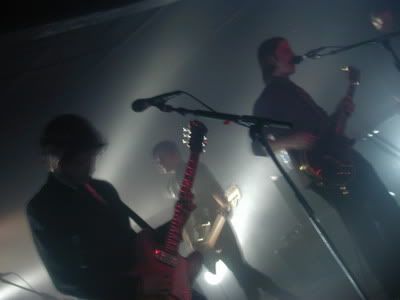 It was a miserable, rainy early-spring evening in Baltimore. The weather in Charm City is predictably unpredictable, no matter the season. As the work whistle blew for construction workers at city hall, they stopped tearing away the park the city’s chess players once worked their minds. As the grinding of the machinery came to a halt, the sound of diesel busses rumbled into ear range. Circling the corner to the city’s premier underground establishments, the busses stopped and Carlos D., Daniel Kessler, Paul Banks and Sam Fogarino emerged one at a time from the folded doors to the street. Each adjusted their sunglasses before removing them entirely, as the overcast Baltimore sky wasn’t harsh to their nocturnal eyes. As Fogarino walked to the steps of the bus, squinting his eyes, he waves to the dozen or so fans waiting nearly six hours before for the show and flashes a smile, less one tooth.
It was a miserable, rainy early-spring evening in Baltimore. The weather in Charm City is predictably unpredictable, no matter the season. As the work whistle blew for construction workers at city hall, they stopped tearing away the park the city’s chess players once worked their minds. As the grinding of the machinery came to a halt, the sound of diesel busses rumbled into ear range. Circling the corner to the city’s premier underground establishments, the busses stopped and Carlos D., Daniel Kessler, Paul Banks and Sam Fogarino emerged one at a time from the folded doors to the street. Each adjusted their sunglasses before removing them entirely, as the overcast Baltimore sky wasn’t harsh to their nocturnal eyes. As Fogarino walked to the steps of the bus, squinting his eyes, he waves to the dozen or so fans waiting nearly six hours before for the show and flashes a smile, less one tooth.
The appearance of Interpol in Baltimore was unexpected considering the lack of larger-scale club venues in the city to accommodate their itinerary. The fact that they were playing at the underground culture warehouse Sonar was downright shocking. The venue was making some rumblings for opening their doors to popular electronic and D.J. acts like Crystal Method and L.T.J. Bukem, but to have these praised perpetrators of indie rock was a staggering leap forward for an institution destined to expand into new things.
As the crowd packs tighter towards the chipped paint on the stage barrier, ventilation gets worse and worse. Fresh air becomes a luxury in the front rows, where the chain smoke ultimately filters like a gas chamber. Just as fire codes snap in two and the smell of vomit begins to permeate, the lights come down. A collective 10 feet appears from the crowd’s excited gasps. The visibility is so bad that only the ivory silhouettes of the group stand out from the floating grey. The band seamlessly melds into their instrumental roles, arriving on stage to the organ of Antics’ opener “Next Exit”. The intro fades into the note-pairing guitar work from Kessler and Banks, who’s dry vocals haunt every listener. The complex, anxious drumming of Fogarino mesmerizes and by the time the group evolves into “Untitled”, he and Carlos are having their way with everyone’s attention.
Carlos D. is a sight in person – appearing over 6 feet tall on stage, with stage attire stolen from the Madison Ave. chapter of the brown shirts, he dances and writhes with his own bass rhythms, sometimes leading songs more than his counterparts. He is never contrived and never anything but artistic, like a rejected design from the Warhol Factory, digging in his renaissance decades after conception. Fogarino may be the best jazz drummer in indie rock – he works like a Swiss watch, as intricate as modern instrumentalization gets on stage. Every nuance is necessary to the song, impossible to imitators and elementary in his hands.
“Slow Hands” comes in with a rapturous attack and the crowd lifts with it’s multiple ascensions, coming down twice as hard upon each delivery. Every repetition causes a greater surge of the crowd. “Obstacle 1” keeps the pulse moving quickly, swaying with an angular twitch from Carlos that jerks necks from side to side. The effortless blending of songs from both Turn on the Bright Lights (including a suffocatingly urgent performance of “P.D.A.”, “Say Hello to the Angels”) and Antics (“Public Pervert”, “Length of Love”). The entire band is in peak form for this show, which is later judged among insiders and fans alike as one of the tours’ best. Banks agreed calling the assembly a “fucking bad ass crowd” before departing after the first set closer “N.Y.C.”
The appearance of the rarely performed “C’Mere” made the show all the more memorable and proved the impression left by the crowd on the band. The power of Interpol performances are mutual, with the crowd’s euphoria turning the band on like a switch and generating a greater reaction from the crowd. The song carried the vital, unrelenting sound into the bouncing bridge and pre-chorus again building the crowds excitement until choking them on their own bliss. A euphoric version of “Roland” nearly sends the crowd into joyous turmoil as Kessler choked the riffs from his Epiphone, shaking it into the flight-of-steps-falling chorus, finally calming slightly with “Stella Was a Diver and She Was Always Down”
Interpol showed their teeth at every turn during their performance, coming to the verge of animalistic explosion but staying slightly subdued. The best characteristic of the music is their restraint – their ability to light a fuse, let it get within inches of the powder keg before extinguishing it and lighting a new one somewhere else. Tonight, the fuse came closer than ever as nearly Baltimore burned inside-out by one the most cherished live bands in the world today.Interpol's Official Website www.interpolny.comMatador Records Site vww.matador.comReviewed for Earlash Music Sight www.earlash.com 
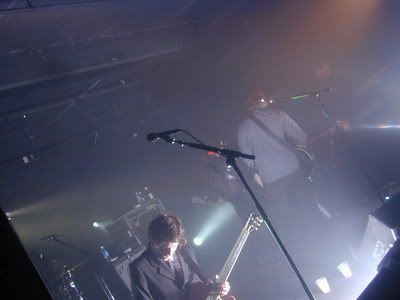
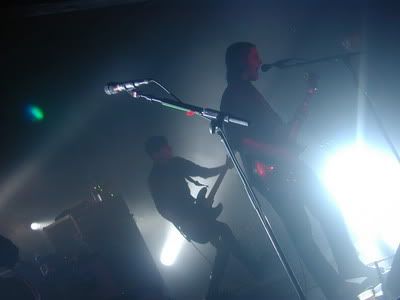
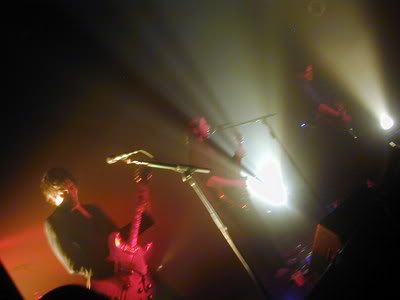
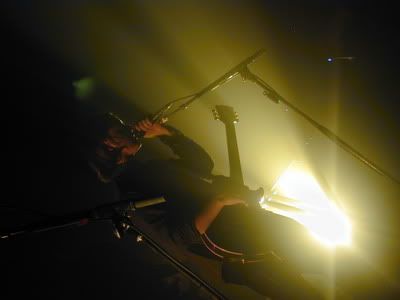
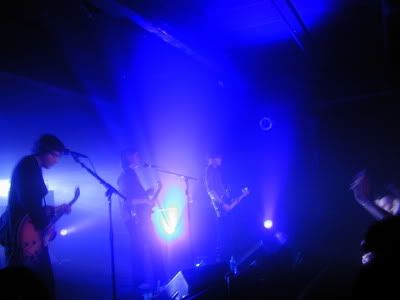
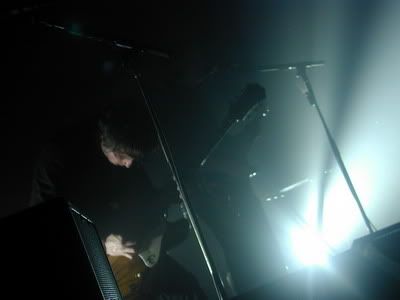

Album Review | The Soundtrack of Our Lives : Origin Vol. I (2005, Republic/ Universal)
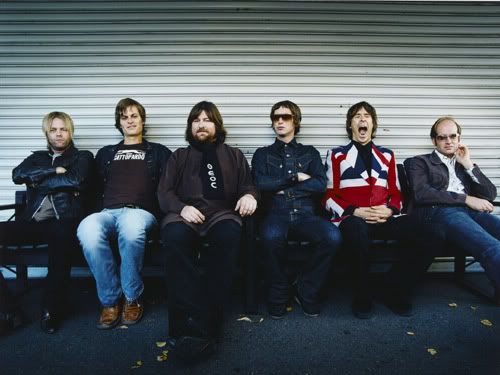 Bands from Sweden have earned a deserved reputation in the years after the garage explosion. M aking firm declarations on their own questionable greatness and acting pompous have become the calling card of a collective genre as much as dying on their second album. While the Soundtrack of Our Lives can be just as guilty as some for playing by these rules, they have made themselves Sweden’s most fascinating acts. They have transcended the vogue and become a respected act musically, all the while doing so with a devout political agenda. On their forth album, the group (assembled from former parts of Union Carbide Productions) has taken their psychadelia-meets-arena rock another step forward, extending their sound and poise.
Bands from Sweden have earned a deserved reputation in the years after the garage explosion. M aking firm declarations on their own questionable greatness and acting pompous have become the calling card of a collective genre as much as dying on their second album. While the Soundtrack of Our Lives can be just as guilty as some for playing by these rules, they have made themselves Sweden’s most fascinating acts. They have transcended the vogue and become a respected act musically, all the while doing so with a devout political agenda. On their forth album, the group (assembled from former parts of Union Carbide Productions) has taken their psychadelia-meets-arena rock another step forward, extending their sound and poise.
On 2002’s Behind the Music, the group produced some of the most memorable rock songs (Sister Surround”) and political anthems (“Independent Luxury”, “21st Century Rip-Off”) rooted in the trade protests and riots in their capitol of Gothenburg in the years around the record’s creation. The defiant tone of the record seemed to foreshadow a tongue-lashing for the Bush administration on the next record. The album does confront the uninvited rule in America, but the delivery is carried with less of the furious acting out but the acerbic shrewdness in the lyrics is sharper than ever.
Opener “Believe I’ve Found” is a critical observation of modern culture as singer/ lyricist Ebbott Lundberg tiredly declares “I believe I’ve found/ a better way to satisfy your kind”. An undoubtedly harsh statement, but meaning is a bit shrouded after opening lyrics hint to a greater loss of family, art and individuality. Lundberg and the band have championed themselves on being righteous soldiers in the war against complete control, fighting for freedoms in art, trade and other causes. It’s that battle and the underlying tone of secret warring that makes their music so intriguing.
Both “Transcendental Suicide” and “Royal Explosion (Part II)” are forceful Who’s Next-style anthems of frustration and rebellion. They each assail the evident profit of Bush Act II, and make it know that half-a-world away, the ripples of his profiteering agenda are already delivering their consequence. “Big Time” takes it a step further name-checking stem cells, news tampering, and the penetrating coupling of “so what’s the occupation/ what’s your dedication”. Origin Volume I’s critical tour de force is U.S. bonus track “World Bank”, which heavy handedly attacks the conquering financial organization with “I’m a link in a chain/ an everlasting chain”. In his words, Lundberg always maintains a fair and just sense of where the citizen fits in the scheme of capitalism and where they actually deserve to be.
Even if listeners want nothing to do with the world politics of aging Swedes, their magnetism and big riffs draws attention. The dueling guitarists Mattias Barjed and Ian Person and the rhythm of Kalle Jerneholm (bass) and Fredrik Sandsten (drum) have a stadium-honed sound with enough unique melodies to hypnotize a battalion of freedom fighters. The practiced showmanship of Lundberg is remarkable, considering that breathy vocal scratch is emanating from a prancing 300 lb. man. His voice is one of rocks most dynamic, going from howl (“Age of No Reply”) to swoon (on the Jane Birkin accompanied “Midnight Children”) effortlessly and purposely.
The Soundtrack of Our Lives has been one of the most authentic rock groups for over 12 years. Their politics have been as ham fisted as their influences, but their righteousness and sense of responsibility in fame aligns them as the successor to the Clash’s role of rock’s political conscience. The progressive but accessible guitar sound promotes their statement perfectly in a “spoonful of sugar” kind of relationship. Origin Volume I is a burning reassessment of values and integrity for the world and a protest record to rival “American Idiot” in message and easily eclipses it in musicianship.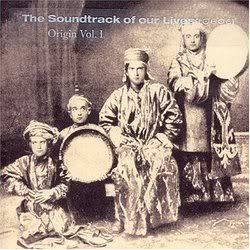 Buy the album hereThe Soundtrack of Our Lives' Official Website www.thesoundtrackofourlives.netUniversal Records Website www.universalrecords.comReviewed for Earlash Music Sight
Buy the album hereThe Soundtrack of Our Lives' Official Website www.thesoundtrackofourlives.netUniversal Records Website www.universalrecords.comReviewed for Earlash Music Sight
sAlbum Review | Ash : Meltdown (US - 2005, Record Collection)
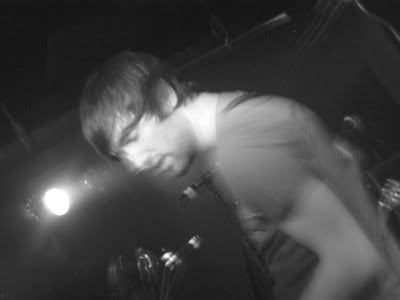
Inexplicably, American record labels have never been to keen to Ash. Their first five records have been hits in Europe, Japan and Australia, yet have still failed to break stateside. Formulating a near-copyrighted sound of power chords, blissful hooks and excitable melody, any unsuspecting listener could fall victim easily to their abundant charms. Transmitted through a million-watts of charisma during vibrant live shows and support tours with everyone from Coldplay to Foo Fighters, the band has become one of rocks best known “unknown” acts. The indifference of the American record industry now finds Meltdown released a year after it’s street date everywhere else on the planet.
Their turn towards the dark side is blood-thick, if the cover of Meltdown is any indication. However it is not. The fact that it is a reproduction of a sleeve-length Phoenix tattoo now sported by Wheeler himself doesn’t do much. The bass lines of Mark Hamilton still wind through every second of their songs, but the looser thump seems attributed to Weezer-alum Matt Sharp (who receives considerable liner note-credit). Rick McMurray has always had the rambunctious spirit of either a speed-freak or a child in his drumming, and this record is no exception. Playing two or more beats where one would be sufficient, his work could easily serve as the hardest element on this “hard” record.
On her third official record with Ash, guitarist/ femme fatale Charlotte Hatherley has gotten Wheeler’s guitar style matched, combining the force of the riffs that were already a powerful entity. Though Wheeler still bangs out most of the solos live on his Flying V, Hatherley’s chops are honed enough for her to keep up with (if not better) this boys club. The theory is proven on U.K. single “Renegade Cavalcade” as the charging twin riff propels as much as the gravity defying chorus.
The title track also hints to a Motorhead cover only to fall back into form with effects and an Earth-rattling chorus. “Clones” is another of several singles that populate a record full of potentials, raging and sugary at once with addictive properties crammed to the front. While some songs have a crunchy, tooth-spitting lead, they’re still the sum of Wheeler’s endearing craft. The harder edge is just trim on the ascendant chorus and the slippery slope of his hooks, which suck attention towards them. Resistance is futile.
With all the posturing as a harder act, Ash remind of children wearing their parents clothing. This record holds very subtle if not imagined sinister elements. This is still the same old wonderful Ash: neither dumb nor challenging. Three chords to a chorus and words that flow sweetly into a chorus that any arena could sing back to them. Regardless of what’s on the outside, a band with gifts as gratifying as Ash cannot change under their wrapping. Ash’s identity is defined by their idyllic pop-rock and Meltdown’s buzzsaw image can’t change it.
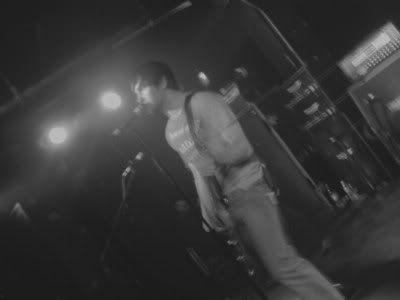

Buy this album hereAsh's Official Website www.ash-official.comRecord Collection site http://www.recordcollectionmusic.com
Reviewed for Earlash Music Sight www.earlash.com

Live Review | The Soundtrack of Our Lives at 9:30, Washington, D.C. March 21, 2005
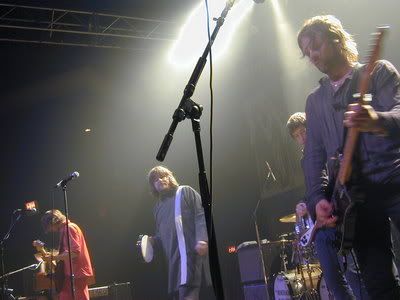 “Johnny Thunders!”
“Johnny Thunders!”
“Well. Yes. He is buried in Sweden. Yes… too much baseball for him.”
Sweden’s The Soundtrack of Our Lives have become a perfected rock n’ roll animal over the last eight years, transfixed by the thumping sound of the Who and Pink Floyd’s psychadelia. They all five leap on stage in the darkness and take directly to “Believe I’ve Found”, the leading track on their new album Origin Volume I. The bouncy melody propels inflammatory words across a three-quarters filled room swaying to the bass rhythm of Kalle Jerneholm and the strums of Mattias Barjed. During this time, singer Ebbot Lundberg cast a weary eye over nearly every face, as he keeps time with a tambourine held gently beside his right ear. It seems a scrutinizing kick off (more on the performer’s side, than the audience’s), but the power of the message and the bands ability to convey don’t stop at music.
As the opener fades, Lundberg begins to stomp as Barjed and second guitarist Ian Person scratch into the bass drumming of Fredrik Sandsten. “Infra Riot” opened 2002’s Behind the Music and it symbolizes vigorous pace the show will maintain. Barjed and Person perform like a matched pair of Townshend and Richards clones. The wild and flailing Barjed does windmills and jumping splits whenever the music permits him, as Person is the moody antithesis. He’s no less enjoying the moment, but his antics are calm and cool strumming his low-slung guitar, his notes highlighting the quiet opening to “Transcendental Suicide”.
The hushed psych moments are washed out when the low end rattles its way in. Lundberg dances about the stage like a circus bear on a ball, shifting his ample belly to the melody. Between songs Lundberg discusses the inspiration of Washington, D.C. on the music they make. Almost ashamedly, he looks across the faces and says something along the lines of “some don’t understand the impact this city has everywhere else” as the band builds into “Broken Imaginary Time”. If purposeful, it could be a statement unmatched by anything said or done all night (with the exception of excluding the setlist-printed closer “21st Century Rip-Off” from the live set). The inevitable performance of single “Big Time” comes late and is a raging assessment of the band’s deep political convictions with music as furious as the confrontational lyrics built upon it. The smell of sweat leather and denim emanates from the stage as Person makes his second of three blazer changes.
They follow the powerful single with the marching “Mother One Track Mind” and their best known stateside hit “Sister Surround”, one of the widest ranging rock songs written in the new decade. The band wisely maintains tempo as long as possible. By this time every face in the crowd is locked on Lundberg as he mocks the familiar and celebrated guitar poses of Barjed, yet is the first to offer praise for a brilliant solo. The cosmic Swede demands and commands attention from the crowd, even if the spotlight flashes and flickers among he and his cohorts, each stealing it away from moment to moment.
Their albums hint of a colossal power and poise that could fill the universe with big riffs and socially conscious words (and easily a three-quarter-filled nightclub on frozen Monday night). With members in the mid-40s, the group hardly seems to be working on a timetable, plying their brilliantly crafted rock on their own pace. With the Soundtrack of Our Lives human virtue and truth seems to be a priority, daring Americans to realize the truth outside their doors to the tune of perfected arena rock. 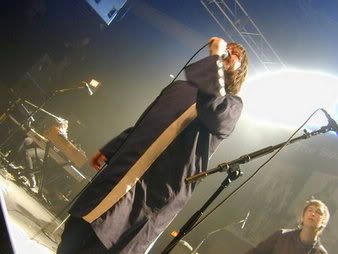
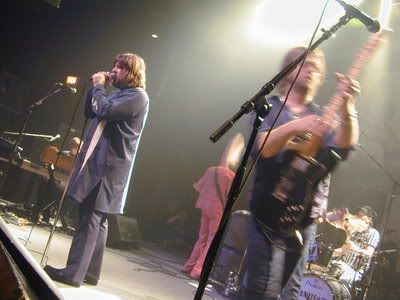
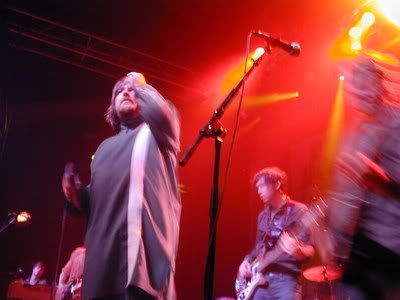
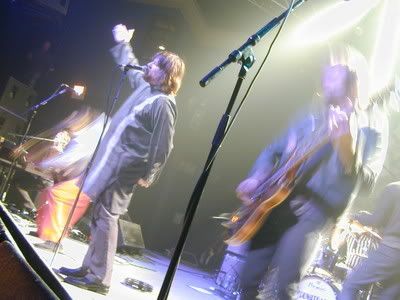

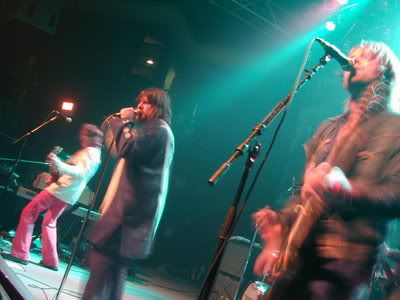
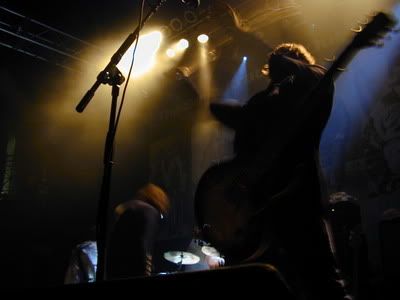
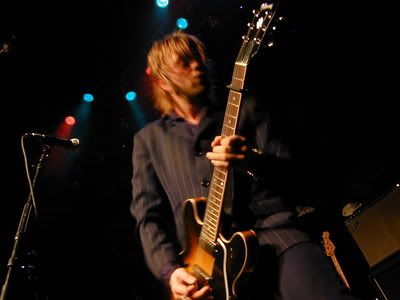
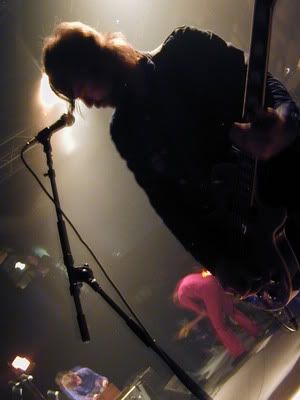
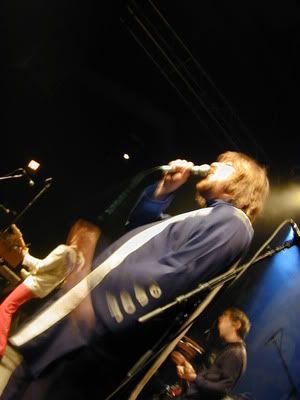
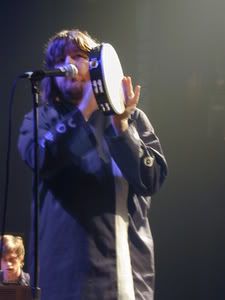
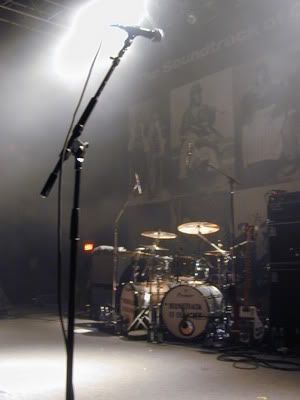
Album Review | Maximo Park : A Certain Trigger (2005, Warp)

As dozens of bands surge out of the United Kingdom with influence from Joy Division, Buzzcocks, the Jam and Pulp, finding an identity is going to become more of a commodity than the tight, coordinated rhythms and angular guitar work. Front men will all share either the sullen, spasm of Ian Curtis, the drunken swagger of Mark E. Smith or the borderline pomposity of Jarvis Cocker. With the demos piling and the cash coming in on a genre that has nearly tapped itself out at infancy, deciding exactly where Maximo Park fit in is going to be more and more difficult.
The lyrics of Paul Smith and, more importantly, how he delivers them separate this Newcastle-Upon-Tyne five-piece from their growing contemporaries. His rapid-fire multi-syllabic bursts are anything but robotic, as he exudes emotion in every breath. Whether speaking of misplaced affections (“Kiss You Better”) and near-obsessive analysis of social class (“Signal and Sign ”), his charm carries to his target. Imagery of him stomping through “Now I’m All Over the Shop” declaring to everyone how he knows what is best can be almost provoking in it’s confidence.
The shuffling pluck of Duncan Lloyd’s guitar work seems standard substance for the style they at first appear to fit, and then his diverse abilities shine through. Thusly songs like “Going Missing” grow around Smith’s words and rise from instrumental repetition into bold, blissful pop. The bass and drum of Archis Tiku and Tom English applies a rhythm so oppressively exact to one another that Smith, Lloyd and Lukas Wooller’s keys are given ample room maneuver their own elements.
“Signal and Sign” rings like an urgent single with arresting hooks and guitar breaks working well over a loosened rhythm. Bravado and sonic excess shove “Graffiti” into willing skulls to rescind into a saunter exposing a once bored, frustrated life. The electronic boom-bip of “Acrobat” drifts over a much more relaxed tempo, with remote church organs balancing Smith’s spoken couplets into a passionate, remorseful chorus bringing focus to heartache. His ability to blend scathing social commentaries with self-consciousness and still maintain his audacious streak makes the group as a whole more intriguing.
Maximo Park is intelligent enough to know that accessibility and melody will carry them across more ears than pseudo-artistic distraction. When their cocksure leader snaps “I’ve met so many people who look the same; most were forgotten but you still remain” opening “The Coast is Always Changing”, realization seeps in that even Maximo Park knows that the scenery is littered with the analogous. Unfortunately, their keen observation and fearless admittance sets them apart only half as much as their addictively neurotic debut does.
Maximo Park's Official Website www.maximopark.com
Warp Records www.warprecords.com
Reviewed for Earlash Music Sight

Live Review | The Bravery at Black Cat, Washington, D.C. March 10, 2005
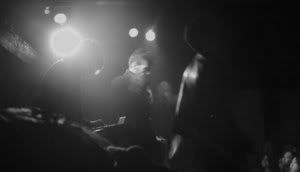
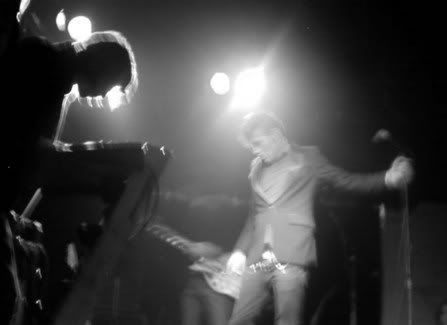 Somewhere in Northwest DC, as the fashionable line the sidewalk to the end of the block, the Bravery prepare in a smoky dressing room. With empty Stella Artois and hair-product bottles strewn about, the dressing room isn't the tattered postcard of rock degradation expected for these synth-punk upstarts. The confessed glamour whores prepare for each show like it were their last, and occasionally provide a dangerous setting that could fulfill that promise. Tonight they are in the unenviable spot of closing their co-headlining tour with British rock mammoth Ash, which is even more treacherous when the Bravery are being deemed the next "next big thing" by the world's music press. The mood backstage is cordial but tense as the band certainly understands that proving their wares tonight is more important than on nights when they are the support act. Failure could prove costly for a band just breaking in despite the praise, and keeping up is the bare-minimum expectation. However this Manhattan five-piece has not cast their reputation on mailing it in.
Somewhere in Northwest DC, as the fashionable line the sidewalk to the end of the block, the Bravery prepare in a smoky dressing room. With empty Stella Artois and hair-product bottles strewn about, the dressing room isn't the tattered postcard of rock degradation expected for these synth-punk upstarts. The confessed glamour whores prepare for each show like it were their last, and occasionally provide a dangerous setting that could fulfill that promise. Tonight they are in the unenviable spot of closing their co-headlining tour with British rock mammoth Ash, which is even more treacherous when the Bravery are being deemed the next "next big thing" by the world's music press. The mood backstage is cordial but tense as the band certainly understands that proving their wares tonight is more important than on nights when they are the support act. Failure could prove costly for a band just breaking in despite the praise, and keeping up is the bare-minimum expectation. However this Manhattan five-piece has not cast their reputation on mailing it in.
Officially a band for only 18 months, they have thus far acquired a ton of ink in their favor, but not everyone has seen what all the fuss is about. Sam Endicott takes the stage first with his supremely coiffed hair taking the lead. Looking something like Morrissey and Glen Danzig in a dark kaleidoscope, the singer's obscene confidence in print seems tempered on stage by a withered shyness. Followed by John Conway on keys, Mike H. on bass, and drummer Anthony Burulcich, Endicott sways and shivers in the waves of guitarist Michael Zakarin into "Swollen Summer." Climbing on a shredding guitar lead, bouncing bass and high-hat rhythms, the song opens perfectly and shows savvy in keeping the groove seamless from Ash's set.
Screeching like an orgasmic pre-pubescent on the verge, Endicott turns the playfully deprecating lyrics of "Public Service Announcement" into a cutting admission of arrogance. A synth framework is cast by Conway on "No Brakes," and he spends the remaining minutes or so completing a six of Stella, carefully monitoring the Powerbook keeping track of his beats. Though the synthesized buzz dominates their sound, the band is more reliant on the nimble craftsmanship of Burulcich's drumming and the bass rhythms of Mike H. to propel the songs. Endicott shows a raw vulnerability that serves to make him more charismatic to the crowd, as he clutches himself, stretches his coat, then leans torso-deep into the front rows.
The band opens up the floodgates with "Fearless" with sneering lyrics, harder bass, and throttling guitar work interweaving with the electrified melodies. The singer becomes more and more destructive as the left-handed Zakarin tears into the razor-sharp solo. Stomping and crying, the temper tantrum runs directly into the deafening intro of "Unconditional." Now at breakneck pace, the group trembles together into the song's thunderous break that rattles the room with united noise. "An Honest Mistake" takes the bliss further into frenzy as the group spasms and seduces the crowd. The quietest moments are now magnified over and over as the band's full focus turns to impressing the next batch of eager victims.
Successfully intermingling the melodic and hypnotic quality of techno with the punk thrust makes even their mid-tempo outings seem like violent assaults on the senses, and both attractive and undeniable. The dirty, wasted life of heavy drinking, drugging, and screwing has made the Bravery notorious, but the songs that they play in between and the room after room that they conquer, prove that all the propaganda may come deeply rooted in truth. 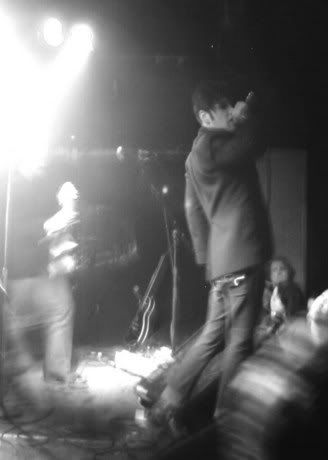
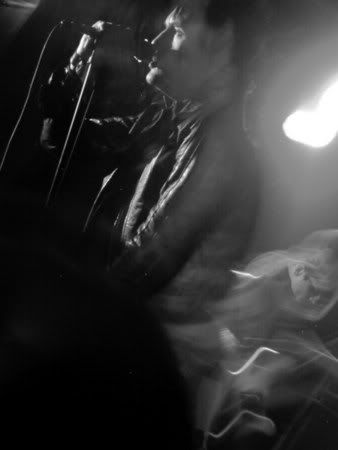 all photos copyright 2005 Rob Macy/ spitfirepress limitedReviewed for Earlash Music Sight
all photos copyright 2005 Rob Macy/ spitfirepress limitedReviewed for Earlash Music Sight www.thebravery.comA special thanks to Jonny Kaps, Ashley Purdum (+1 Music), Kara Tutunjian (Earlash), Patrick Guerin (Legg Mason) and Amy Eroh (Miles & Stockbridge) for their help.
www.thebravery.comA special thanks to Jonny Kaps, Ashley Purdum (+1 Music), Kara Tutunjian (Earlash), Patrick Guerin (Legg Mason) and Amy Eroh (Miles & Stockbridge) for their help.
Gods of Shot and Friends of the Family...
I fell into being a photographer when an oblivious managing editor gave me a camera and a paycheck to shoot live stock auctions and Interstate bloodbaths in 2001. After covering 911 from the Sears' electronics department and dating a gorgeous graphic artist with no personality, I was fired. After writing professionally, I was given a camera from a pair of (in)famous cousins and sneaking it into shows to suppliment my writing. Andrew Kendall is the best music photographer in business today, and his shots in NME are the only thing that keeps me buying the rag every week. Here's two reasons why Andrew is God to music photographers...... 
 Check out Andrew's body of work and bask in awe to the returning majesty of British rock by The Ordinary Boys, The Libertines, babyshambles, Bloc Party, Kaiser Chiefs, The Killers and more. It is safe to say that once Andrew Kendall has taken your picture, you're somebody.Support local artists:
Check out Andrew's body of work and bask in awe to the returning majesty of British rock by The Ordinary Boys, The Libertines, babyshambles, Bloc Party, Kaiser Chiefs, The Killers and more. It is safe to say that once Andrew Kendall has taken your picture, you're somebody.Support local artists: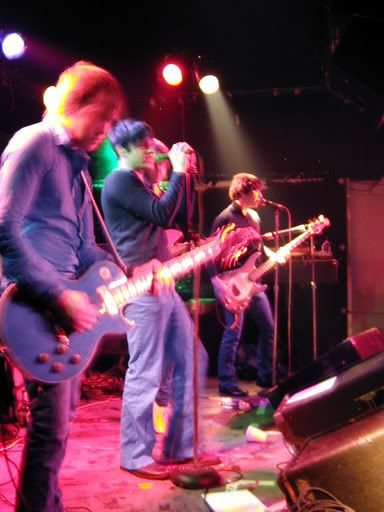 Battersea - Baltimore's moody atmosphericisists with a little baby fat to work off in their second year as a band. Brilliant group despite their age, they have limitless potential.
Battersea - Baltimore's moody atmosphericisists with a little baby fat to work off in their second year as a band. Brilliant group despite their age, they have limitless potential.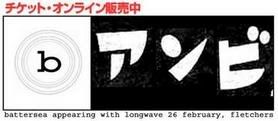
 Forever Valentines: Cover playing side project from country loving anglophiles. Quiet and unassuming, their taste knows no bounds.
Forever Valentines: Cover playing side project from country loving anglophiles. Quiet and unassuming, their taste knows no bounds.
Album Review | Long-View: Mercury (2005, Columbia)
 Once upon a time, George Best and the United were the biggest thing in Manchester. Little Mancunian boys didn’t idolize cowboys, soldiers or astronauts like American children - to a Manchester lad, Best was ace. Then the music blitz hit the area and, behind the inspirational verve of The Smiths, Joy Division and The Buzzcocks, the kids found their idols on a pub stage more than the pitch. Undoubtedly, the sounds of those bands urged Rob McVey, Doug Morch, Aidan Banks and Matt Dabbs to pick up a microphone, guitar, bass and drum stick, respectively. How much indebted to them they are on Mercury, is questionable.
Once upon a time, George Best and the United were the biggest thing in Manchester. Little Mancunian boys didn’t idolize cowboys, soldiers or astronauts like American children - to a Manchester lad, Best was ace. Then the music blitz hit the area and, behind the inspirational verve of The Smiths, Joy Division and The Buzzcocks, the kids found their idols on a pub stage more than the pitch. Undoubtedly, the sounds of those bands urged Rob McVey, Doug Morch, Aidan Banks and Matt Dabbs to pick up a microphone, guitar, bass and drum stick, respectively. How much indebted to them they are on Mercury, is questionable.
First making blips on the music radar around 2002, festival goers and critics alike swore Long-View were destined great things. After a string of EPs and singles, they finally have released Mercury stateside behind the weight of Columbia Records vast budget. They seem to be just what the major labels ordered, blending their dreary Northern heritage with some Americanized guitar effects and colossal arrangements. The tame and practiced sound is anything but the daring glimpses given in either of those arenas.
Long-View manages to pull some bright moments out of this predictable package, most of which are hinged on McVey’s Morrissey-adoring vocals and the occasional Gospel-tinged backing choirs. Aside from that, their best moments were already eclipsed by Idlewild albums ago. Lyrically, they have been beaten by Roddy Womble and company long before they even arrived. The insipid “Falling For You” is a prime example, bearing all the tepid emotion of a junior high school farewell.
Uplifting chorus’ dominate each of the twelve tracks, as their rocketing momentum lift the songs in the classic Brit Pop fashion (“Can’t Explain”). The dense, unrestrained strings and multiple guitar tracks can be distracting, especially when the melody collapses under the weight of the noise. Any hopes of this band reviving the faded Britpop scene ruined by Embrace, they reduce themselves to American-influenced guitar rock (“When You Sleep”). Their reliance on these aural safety nets immediately reduce their individuality and makes them seem pompous and uninspired.Reviewed for Earlash Music Sight Long-View Official Site
Long-View Official Site
Album Review | Ocean Colour Scene : A Hyperactive Workout for the Flying Squad (2005, Sanctuary)
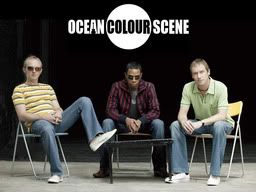 In the opening scenes of Lock, Stock and Two Smoking Barrels, Jason Statham tries slyly to sell pilfered goods on a London street corner. As his card playing partner alerts them of the on-coming law, a blistering single note comes on, building into a riff that grows faster as they flee for their freedom. This perfected soundtrack placement of Marchin’ Already’s “Hundred Mile High City” is the only state-side glimpse into the phenomena of Ocean Colour Scene, a band once deemed as the second-coming of rock n’ roll in the United Kingdom.
In the opening scenes of Lock, Stock and Two Smoking Barrels, Jason Statham tries slyly to sell pilfered goods on a London street corner. As his card playing partner alerts them of the on-coming law, a blistering single note comes on, building into a riff that grows faster as they flee for their freedom. This perfected soundtrack placement of Marchin’ Already’s “Hundred Mile High City” is the only state-side glimpse into the phenomena of Ocean Colour Scene, a band once deemed as the second-coming of rock n’ roll in the United Kingdom.
After following the pre-Parklife path of shuffling dance pop, the group changed their sound and turned heads with 1996’s Moseley Shoals. Mentioned in the same breath as Oasis and Stereophonics (usually in that order), they were more traditionalist than their headline-grabbing contemporaries and were deemed heirs to the mod throne. On their seventh studio album, the Birmingham group (a trio after the departure of founding bassist Damon Minchella early last year) has proved them England’s most consistently splendid (if not most persistent) rock group.
Guitarist Steve Craddock has a reputation as an inventive arranger, as well as one of the world’s finest guitarists. His notoriously meticulous recording habit is the backbone of the group’s sound. Kicking off with a potent Craddock riff, Hyperactive…” shows the signs of the intelligent, focused fury of their early releases most acerbic and catchiest moments. Simon Fowler’s resonant vocals have always walked a fine line between stylistic traits. On “Move Things Over”, he stretches his street urchin drawl into velvet soul honed to a polished stadium glow. Mod icon Paul Weller’s harmony and guitar work blends effortlessly with Folwer and Craddock on “Waving Not Drowning”, as Jools Holland’s nimble piano dances around Oscar Harrison’s steadfast beats.
With violin, banjo and piano bouncing around the inspirationally debauched lyrics, “This Day Should Last Forever” belongs beside The Faces “Ooh La La” on a pub crawl mix tape. The drinking turns to dancehall on “God’s World”, Craddock’s virtuosity carries fragmented funk bass lines over Fowler leading a choir through the verses.
Ocean Colour Scene’s ability to intermingle classic soul, psychadelia and funk with Beatle and Small Faces-derived melody makes them one of the Britain’s most accomplished groups based solely upon repertoire. The volatile shift of interest in the U.K. musical climate has seen them bounce from label to label, despite chart and sales success. With another genuine and impressive record confirming their talents, Ocean Colour Scene is absolutely blissful in their ignorance of trends and passing fancy.Reviewed for Earlash Music Sight Ocean Colour Scene Official Site
Ocean Colour Scene Official Site







































